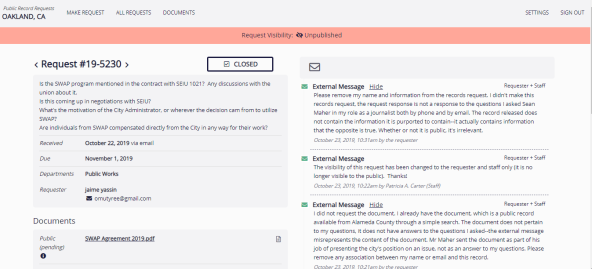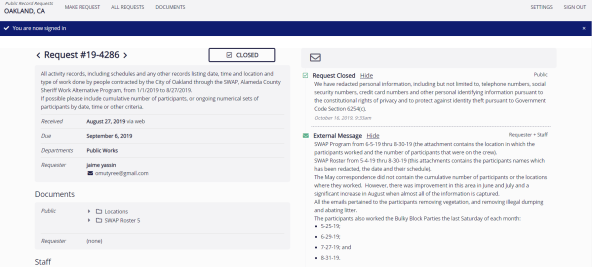The City tried to spin DPW spokesperson Sean Maher’s response to my reporting by opening a records request in my name and submitting the SWAP contract. Though I didn’t ask for the document, and it didn’t answer any of my questions, the kerfuffle revealed even more information DPW was trying to hide.
I recently published a report on the City of Oakland’s use of SWAP program participants to do work normally in the purview of union DPW workers. Shortly after I published the report, the records custodian at DPW apparently opened a records request in my name, suggesting that I requested the Alameda County Sheriff’s Department contract with the City of Oakland for SWAP and publishing the list of questions I asked Maher–none of which could be answered by the document.
The request also contained additional information as part of the records request, which was the actual unfounded response from DPW spokesperson Sean Maher–the response actually contradicted Oakland’s terms and obligations in the contract. You can see below that none of my questions pertained to information in the contract. The first three are all about the City’s interaction with SEIU about SWAP and their stated intention for turning to the program. The last question is to the possibility of City of Oakland taking an additional step to compensate workers as a matter of internal policy. To put it simply, the records request was a both dishonest spin on the SWAP contract and on my questions.

Despite all available information, Maher maintained in our subsequent email exchanges that the City of Oakland’s only role is “facilitating” the arrival of SWAP participants to locations where they can do community service. He later changed the way he defined “facilitation” to include “supervision”–perhaps not the most opposite word to facilitation, but a competitive runner-up. The contract requires responsibilities from City of Oakland aligned with the role of management in a workplace. Of the many responsibilities that completely contradict Maher’s reading of the contract, the City of Oakland is required to maintain “custody” of the SWAP workers—this is clearly the reason why workers sign in with DPW, leave ID documents there and are dispatched from DPW to worksites.
When I called the records custodian at DPW to ask why the record had been opened and to demand my name be removed from the request, it seemed clear that the custodian was under the impression I had asked for the record. My complaint then provoked another chain of events. Someone made changes to the request I supposedly opened, deleting the external message that added Maher’s spin on the ALCO document. The request itself was then removed from public view a few hours later.
But my name remained. It bothered me that Maher had involved me in his attempt to spin the story, and the herky-jerky attempts to walk the record back in some way also suggested that someone, somewhere knew this act was clearly in the wrong. When I tried to log into the request again today, this is what appears–though I would be the actual requester and I was logged in to my account. So there’s no way to know if they’ve removed my name from the request as they no longer allow me, the person they claimed opened it, to see it.

Sometime after this whole boondoggle commenced, I opened a records request for emails from and to Sean Maher’s office during the period beginning on the day I contacted him for information about SWAP. I can’t pretend to know the thoughts of the custodian, but they released their end of the chain of emails within five hours–and one strong argument for why they did is that Maher had duped them into publishing the original request for purposes of his information massage. The custodian’s subsequent complaint that I was looking for a way to get documents outside of the chain of the public records system would tend to bolster that view.
Just to set the record straight. I never asked for the County’s SWAP contract with Oakland. I had it already, it’s publicly available from the ALCO Board of Supervisors website, and it’s published in my article as a link from the publicly available ALCO website. The emails the custodian released captured the previous chain of the discussion between Maher and Director of Public Works Jason Mitchell before the custodian had been cc’d onto it for the records request–and these suggest an obvious reason the contract then became the locus for Maher’s response to my interview.
Mitchell clearly instructs Maher to respond “no comment” to question about the City’s role in directing the SWAP workers [read the chain from the bottom up].

The next day, Mitchell suggests releasing the contract as the response. The sudden appearance of half a dozen cc’d parties–including the county, Sheriff and the HR Director for the City–to the email chain also suggests that the response was the product of some deliberation about how to respond to my questions without revealing any substantive information.
One last thing. Records custodians often leave messages only the requester can see when they log in to their account with the system. I sometimes don’t log in when I get a notification, especially when the documents I requested are released in good faith. In this case, the records custodian left a private message along with the records adding substantive additional information that was not concretely established in the documents. The SWAP workers were directed to every City Bulky Block Party from the time the SWAP program began in May to the limit of my records request in August. The Bulky Block Party is a city program, where any resident in the City can bring a truckload of bulky trash for free disposal at the City’s public works depot once a month.

Given the fact that dozens of SWAP workers are listed on the dispatch and sign-in documents for these days, it’s arguable that SWAP workers underwrite the entire event with their free labor. Union workers dispatched on those days would likely earn overtime, and/or the City would have needed to hire new workers to perform these duties if they hadn’t had free SWAP carceral labor to rely on.
Posted on October 26, 2019
0